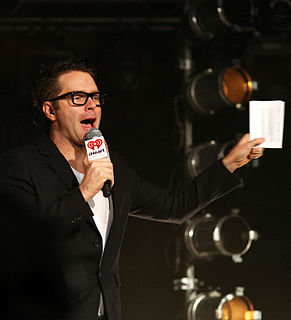A Quote by Brandon Stanton
I think that even though some of the things on 'Humans of New York' are kind of very personal and very revealing, I think the discomfort with sharing that tends to be overwritten by the appreciation of being able to distill the experience of your life into a story and share it with other people.
Related Quotes
I love New York very much, and it was very important for me to spend my 20s in New York City. You're exposed to so much here, whether it's other people or just the grind of it and how hard you have to work. I think it forces you to define yourself: what kind of person do you want to be? What kind of woman do you want to be? And then inevitably, what kind of actress do you want to be?
We actually needed the memory - if you see the film - as a very different kind of a plot device of revealing some information to our main character. So we chose to represent it as these sort of beautiful little snow globes, which kind of, weirdly, that's the way we think of memories - at least, most of the folks that we talked to. You think of these memories as being very pure and absolute and unchanging. That's not actually real life.
I think as much as the city is changing us, our experience inside the city also changes. I think, a city like Cairo - and it's interesting because yesterday, a friend of mine told me the same this thing about New York - is a city that you can't control. It's very bold and very aggressive, and it will constantly resist any attempt at control. But even though you can't control it, you can find your path within the city. You can come to a better understanding of your relationship with it.
I dont want to sound gloomy, but, at some point of your lives, every one of you will notice that you have in your life one person, one friend whom you love and care for very much. That person is so close to you that you are able to share some things only with him. For example, you can call that friend, and from the very first maniacal laugh or some other joke you will know who is at the other end of that line. We used to do that with him so often. And then when that person is gone, there will be nothing like that in your life ever again.
It's always been a battle for me between personal goals and wanting to be able to share the success I've had with my family. And I guess as I've gotten older, I've kind of realized, you know, you can do all these cool things, but if you don't have people in your life to share it with, what's the point?
As a lover of New York, I hope New York remains as successful as a city, even though the very groups on whom the city depends - like artists - are not finding it easy to stay here. That's what it's been about, really, since the 1980s. You can kind of see that coming in the 1980s even though the rents were ridiculously low compared to what the rents are now.
One big disturbance, I think, between L.A. and New York is that New York is so condensed and together that it's very hard to be private there. There's a lot of constant interchange, people know what you're doing all the time. Here in L.A. it's the opposite, it's very spread out, unless you make a conscious effort to go someplace and look at something, you don't see it and we hear about it. So in that sense, it's a city where you can be very anonymous if you want to be, or even if you don't want to be.
There's a lot of talk in some of the other versions of the Bible, the Hebrew versions, and things about the end of the world not being a punishment from God, but being an invitation from mankind. That mankind has to invite its own destruction. And I think that's very true, and it's almost very American. I think that's the type of society we're in and it's people's very fear of the Antichrist that has created it
I will say, though, that San Francisco is a very friendly city. It's the kind of place where people smile at you and you can strike up conversations on the street, so there's always an adjustment when I come back to New York. If I smile at someone on the street in New York, then they think there's something up - like, "Why is she smiling?"
...a very terrifying aspect of our society, and other societies, is the equanimity and the detachment with which sane, reasonable, sensible people can observe [war and human suffering]. I think that's more terrifying than the occasional Hitler ...or other that crop up - these people would not able to operate were it not for this apathy and equanimity - and therefore I think that it is in some sense the sane and reasonable and tolerant people who should share a very serious burden of guilt, that they very easily throw on the shoulders of others who seem more extreme and more violent.


































